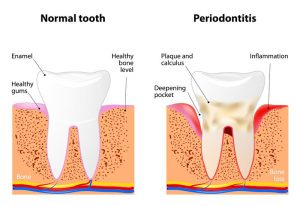
Periodontal diseases are bacterial infections that affect the tissues and bone that support your teeth. A periodontist is a dentist who specializes in the prevention, diagnosis, and treatment of periodontal disease, and in the placement of dental implants. Periodontists are also experts in the treatment of oral inflammation. So, periodontics is the dental specialty of identifying and treating bacterial infections of the teeth.
Among the types of periodontal diseases there are two that are most common:
- Gingivitis
- Periodontitis
Gingivitis is a consequence of plaque deposits on your teeth. It is a major contributor to tooth decay. If not removed, plaque hardens into deposits called tartar, that typically is trapped at the base of your teeth. It can cause inflammation and irritation of your gums. Gums then may become infected, they may swell, and become tender. Your gums may bleed. If treated early, gingivitis can be eliminated. However, if not treated in a timely manner, gingivitis can worsen, developing into periodontitis.
Periodontitis is infection in the area around your teeth. If not treated, the inflammation caused by periodontitis can damage your gums and underlying bone, which may lead to tooth loss.
Signs of Periodontal Disease
- Gums that bleed easily when brushing or flossing
- Red, swollen, or tender gums
- Gums that have pulled away from your teeth
- Persistent bad breath
- Pus between your tooth and gums
- Loose or separating teeth
- A change in the way your teeth fit together when you bite
- A change in the fit of partial dentures
Treatment of periodontitis usually consists of two phases: deep cleaning and root planing. Deep cleaning consists of scaling, during which your provider scrapes away plaque and tartar that has accumulated along the gum line and on your teeth.
Root planing cleans the root surfaces and restores clean and smooth surfaces to your tooth root, which allows your gums to reconnect to your tooth root. Once this treatment is completed, ongoing home oral hygiene can keep problems from recurring.
If you experience any of these symptoms, call Salt River Dental for an appointment. Your Salt River Dental provider can assess your situation and create a plan to treat your tooth and gum disease.
If you have any questions about our services, please contact us today at (480) 948-6549.
